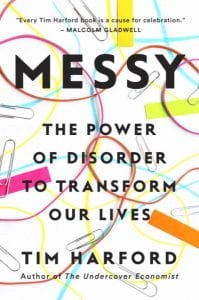Unfocused Attention
I’ve been feeling totally unable to stay focused, that my attention divided in so many directions that in the end nothing gets done. In addition to teaching my #PBL classes, I am working on some micro-credentials. My husband and I are also planning a cross-continent move in the next six months. And, since we have lived in the same home for 18 years, there is major decluttering to be done!
Tim Harford, in Messy: The Power of Disorder to Transform Our Lives reassures me that “…having several projects may seem distracting, but instead the variety grabs our attention - we’re like tourists gawping at details that a local would find mundane…” [p. 28]. He further states, “…while we’re paying close attention to one project, we may be unconsciously processing another…” [p. 28].
Which is perhaps what led to using picture books in my literature and storytelling class this past week. As I document here and here, I’ve been reflecting on how experiences with books and reading at an early age gives kids a huge advantage in their future success in school (and life!). Not only does reading with our children provide them with exposure to and modeling of the reading process, it creates a positive emotional connection to books and reading. As this Washington Post article points out, it also helps them become “empathetic citizens of the world.”
Study after study shows that early reading with children helps them learn to speak, interact, bond with parents and read early themselves, and reading with kids who already know how to read helps them feel close to caretakers, understand the world around them and be empathetic citizens of the world
So, I should not have been surprised when my teenage students expressed such glee when I assigned them close reading of picture book biographies. Perhaps they are also feeling the nostalgia of their younger years, being read to by a caretaker.
